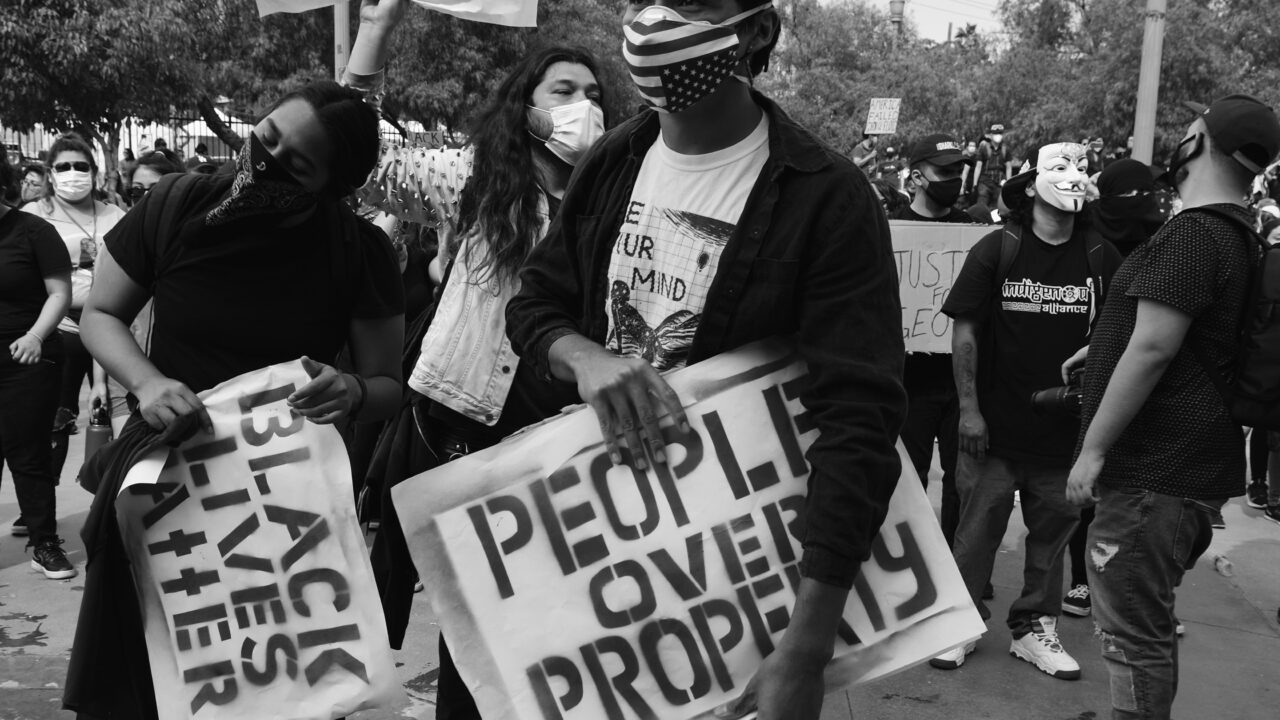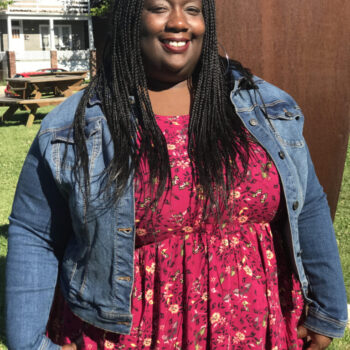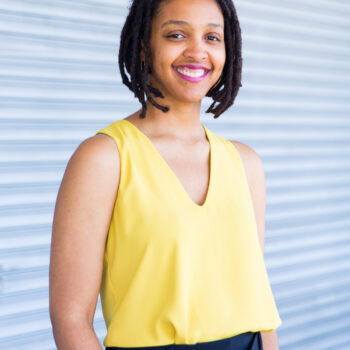Tracey Corder is the Deputy Campaign Director on policing work for ACRE, the Action Center on Race and the Economy. She sat down with Solana Rice, the co-executive director of Liberation in a Generation, to talk about the cultural and narrative work that needs to happen to make abolition possible — and what it would look like to live in a society rooted in abundance and care. The interview has been edited and condensed.
I would love to know your personal reflections on the last year.
So for me, this past year has really been about creating community where I could find it. The pandemic in itself was really hard for me. I live in Oakland; my family is from Milwaukee, and I used to be able to travel back home, check in on my mom and my niece and all the people I love there. Then that stopped, and I had to really look within myself to figure out how to ground myself. I think in the broader sense, we really saw a public reckoning. We were all at home. We were all consuming the same news on our timeline. Folks who have been really comfortable in ignorance could no longer be comfortable, so they had to make a decision like, “Am I still going to ignore it, or am I going to try to jump in where I can jump in?”
What’s the connection between defunding the police and dismantling racial capitalism? Could we just defund the police and be like, “Great, now we’re done”?
Nope, nope, nope. I have to give a shout out to my dear colleague and friend, Alyx Goodwin, who said, “Police are the muscle of racial capitalism.” I said, “Girl, what? Say what, now? Say that again.” Police exist to protect property and not us and we see that over and over. We’ve seen that throughout history. We’ve seen that in protests. We’ve seen that in labor protests. That is what they do. They protect capitalism. And so, when we talk about defunding the police, it’s not just a budget line item. It can’t be because that is not a shift in power. The power is in that money that you shift into community.
Defunding the police, if we are not clear about what we mean, we’re going to see people use it as an austerity measure. So we’ve already seen that in Chicago, where we’ve seen the mayor talk about, “Oh, we’ve got to cut back on all of the departments.” We’ve seen that in Oakland with [Mayor] Libby Schaaf. In the dead of night, she decided to take away policing from a community without doing the work with that community to see what they wanted to be taken away and to see what replaced it.
So when we talk about defunding the police, we’re actually talking about shifting power away from the state and giving it to the people who it was taken away from. I want to also be clear because I think that when we talk about Defund, folks think about, oh, you’re giving away something, or, this is a handout, and what we’re talking about is replenishing the purposeful divestments from our communities. What we’re saying is, you need to take that power away from the state and give it back to the people that you took it from in the first place.
What is the role of the state? You spoke about removing power from the state, and at the same time, what I’m seeing is that, if we need $100 million for schools, the state is the one, especially the federal state, that can make that money happen because it prints the money, right?
Right. And could print more money, if we’re being honest.
Yeah. It could print more money. So I’m curious about your take on what is the role of the state, knowing that it perpetuates violence and knowing that it can provide those real investments that you were just talking about?
I don’t have the full answer, but what I do know is that the answer to how we govern is participatory. There’s this fascination with bipartisanship. That is stupid, and it’s not even true because the Republican legislators do not even listen to the Republican base. I actually hate polling. I don’t think polling should dictate policy. I think that morality should dictate policy, but if we’re looking at polls of people, people are for increased minimum wage. People are for healthcare for all. They might not be for [it] if you are calling it one thing that you have attacked for years and years, but people are for these things.
There’s not a question of bipartisanship amongst what people want; it’s bipartisanship between the elites who are sent to Congress, and that is the problem. Folks who are elected should be following the directive of people. So I’m working with this coalition, The People’s Coalition for Safety and Freedom, to repeal that ’94 Crime Bill and replace it through democratically-written legislation. We’d have people’s assemblies all over the country, and people who are from impacted communities would say, “This is actually what we want on the ground.”
It sounds like that’s also a really important part of a vision for safety. I’m curious about your vision for safety that replaces policing and imprisonment.
I think people expect the other side of abolition to be a utopia, and that’s not fair. It is that we have different sets of problems. We’re going to see something new. We’re going to fix it a different way. We’re going to be innovative.
I do this visioning where I take people through a good day and I say, “What does a good day look like for you?” And we envision it together, what it looks like and smells like and sounds like. Then afterwards I say, “And who saw police? And who thought: Where the prisons? And who was like, ‘When is this PO coming?'” Nobody thinks that, and so if we can start from that vision to say, “Okay, we’re not going to be there today and we might not be there tomorrow, but how do we build towards this vision where kids can open fire hydrants and play in them in the summer without the police rolling up, right?” How do we build towards this vision where there is some abundance and there’s some happiness?
We do this thing, and I’ve seen it over and over again, [we say:] “We want poor people to just have enough to survive.” That’s not the vision I have for us. I want to have manicures and Jordans. I want everybody to take vacations. I want everybody to have a garden in their community, a green space. I want everybody to be able to have all of the things that bring us joy. We talk about really basic things that we should have like clean air, clean water, but what are the things that are above that? What are the things that make your life happy? We all deserve those things.
What’s keeping us from abundance. Why aren’t we there?
Capitalism has really played some tricks on us and made us think that our worth is based on our output. So if somebody is not outputting as much as me, then they don’t deserve as much as me, and that’s not true. It’s hard because that’s reinforced everywhere we look. I talk about this with policing too. Law and Order has been a thirty-year infomercial for police. There’s a humanization that happens to police that nobody else gets. Even some of our favorite shows about superheroes, the redemption arc happens when they start working with the police. So that’s a lot to overtake. That is a lot to deprogram. It’s something that we’re all still working on. Abolition, I think Mariame Kaba says, it’s a destination. So we can’t believe that folks are going to just see our way overnight; we have to organize and listen in our organizing.
What different kind of problems are you looking forward to on the other side of abolition?
I think that there’s always going to be power struggles over who’s the decision maker, and I look forward to us figuring out how to handle that in a different way. I also look forward to problems like, “Are we going to walk to the park or to the store?” I look forward to having more principled discussions rooted in love and caring about the ways that we will care for each other.
I love the idea of more mundane decisions because right now, too many people don’t even get to have those mundane opportunities. It’s not whether I’m walking to the store or to the park, it’s like, “I don’t have food. I’m not talking about walking anywhere.”
Right. It’s like, “Do we build a trolley or a high-speed rail? Which union labor do we go with because everybody’s unionized?”
What are you hearing or saying on a continual basis that remains unheard.
This is going to be messy. We have been ingrained with every -ism. That is what surrounds us and no matter how good of a person that you are, you have been impacted by these -isms. So that’s going to show up in the work, and it’s not going to be perfect. It’s not designed to be perfect. It’s designed to be something that we work through together, and I hope that we can have principled struggle and grace with each other to figure that out.
Are there any other things that you really wanted to say?
One of the things I wanted to say was, when I show up to panels, when I show up to interviews, I feel really deeply that the reason people feel what I have to say is relevant is because a Black person had to die. I feel that really deeply, and it’s a lot to carry, but it’s necessary to carry so that I know never to center myself.
Last year, I was doing an air purifier project for Oakland. I was on a panel about some of their research and I said, “Oh, I’m getting an honorarium. I’ll just split it with you because this is your research I’m talking about,” and they said, “Oh, just put it to the air purifiers.” I was like, “Wow, thank you.” Figuring out how we can move resources into mutual aid, figuring out how we can uplift those efforts was really central to how I felt I needed to show up in movement, and how the people I really rock with felt like they needed to show up in movement. That was really important for me to say and I think it’s also what’s really important to try to navigate and continue to struggle for.


